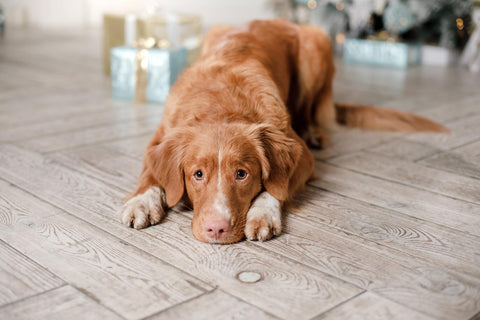As caring pet owners, watching our dogs pace restlessly can be worrying. While pacing is sometimes entirely normal, it can also be a sign that your pup is upset or uncomfortable. Read on for three common causes of pacing, and three handy tricks to help your dog settle.
Key Takeaways
- Pacing and circling are entirely natural behaviors that dogs often do before certain actions, like lying down or going to the bathroom.
- However, pacing can also be a sign that your dog is stressed or lacking stimulation.
- Pacing can be more common in older dogs, who might find it difficult to get comfortable.
- Supplements like our Joint Supplements Bundle can help support your dog's joints and bones, and our CBD-based products line can help promote relaxation.
See Related: Does Dog CBD Oil Go Bad? Tips to Maximize Shelf Life
Why Your Dog Is Pacing
Is your dog restless? A pacing dog is a familiar sign for many of us pet parents. Less familiar, however, are the reasons why some dogs seem to be compelled to walk back and forth.
Fortunately, there's been plenty of research into dog behaviors, including pacing and circling. Unfortunately, a dog might pace for several reasons.
First, it's important to note that not all of those reasons are bad. Pacing or circling is sometimes done before certain activities, for example.
Think of how your dog goes to bed. Have you noticed them settling down? Perhaps you've noticed how dogs often seem to spin in circles before lying down.
But why? Some experts think it's a behavior learned by the wild ancestors of our furry friends, done to scan the surroundings for danger before getting some shut-eye. Others argue it's a way to ensure a dog's sleeping spot is nice and comfy.
That second reason is supported by a casual study done in 2016. Of 62 dogs tested, about one-fifth turned at least one full circle before lying down on a smooth surface. But more than half of the dogs circled before resting on a less even surface made up of shag carpet.¹
To give another example, think of how your dog gets ready to use the bathroom. Have they ever spun around a couple of times before relieving themselves?
You might think that's also an old behavior done to look for danger before getting into a vulnerable position. But according to one study, dogs pace before peeing to align themselves with the Earth's magnetic field.²
Regardless of the specific reasons why dogs pace or circle before sleeping or using the toilet, it's clear this is a common, natural behavior and nothing to worry about.
Then, what should we think of excessive pacing in other situations? Let's cover three common causes.

#1 - Stress
Take a moment to think about what pacing signals among us humans. It's a classic sign of nervousness, right?
Research has confirmed that people often pace due to stress.³ In fact, it's such a stereotypical sign of nervousness that it's used by fiction writers to tell readers or watchers that a character is stressed!
While pacing isn't quite as closely associated with stress in dogs as it is in humans, it's still a fairly common sign that a dog is nervous.
For example, in one study from 2021, roughly 16% of dog owners reported their furry friends pacing in response to household sounds.⁴ Dogs were more likely to retreat from the sound or bark than pace, but were less likely to show more severe signs of stress like shivering or hiding.
You might be wondering why dogs (and people!) pace when they're nervous. More research needs to be done for dogs specifically, but among humans, pacing might be a way to get exercise, which can help the brain sort through tricky situations.⁵
Research also suggests that pacing might help reduce stress, possibly by being exercise, or by simply being a calming repetitive motion.⁶
In short, then, persistent pacing in dogs could be due to stress.
If that applies to your dog, think about whether they might be facing anything stressful right now. Something that might seem totally banal to you could be seriously worrying your pet. Even simple household noises, like the ones that prompted pacing in the study from 2021, can upset dogs.

#2 - Age-Related Changes
In some cases, dogs might become stressed by different things as they age. Younger dogs, for example, might be more easily spooked, as many things are totally unfamiliar to them.
Older dogs might also pace due to stress. But sometimes elderly dogs pace for entirely different reasons.
Senior dogs, like senior humans, become less physically capable as they age. Their muscles often become weaker, they may need more rest, and usually become less active.⁷
All these changes sometimes make it difficult for dogs to get comfortable. And if they can't get comfortable, they might pace back and forth.⁸
#3 - Boredom
Another classic reason for pacing in humans and dogs is boredom. With nothing better to do, a bored dog might pace back and forth.⁹
Ways to Help a Pacing Dog
We've covered three common causes of pacing in dogs. Now let's address three things you can try to help and support your pacing pup.
Bonus: What Are the Benefits of Liposomal Glutathione for Dogs?

Add Supplements to Your Dog's Diet
Supplements are a great option for dog owners who think their dog is pacing due to stress or age.
CBD, for example, has been shown in studies to reduce the effects of normal environmental stress in both humans and dogs.¹⁰
That's why we use organic CBD in our range of calming treats and supplements.
These range from delicious treats, like our Duck & Apple or Beef & Pumpkin soft chews, to wholesome products like our CBDa oil with CBD.
Our CBD products can help your dog manage normal stress and may reduce hyperactivity and promote relaxation.
CBD and other hemp-derived compounds are also great options for supporting healthy bones and joints. We offer an all-organic Mobility Hemp Extract, featuring an optimal 4:1 ratio of CBDa oil to CBD oil to enhance joint and bone health.
Our Focus + Immune Capsules are another great option for connective tissue, bone, and joint support.
Make Sure Your Dog Gets Exercise and Stimulation
If your dog is pacing because they're bored, you simply need to give them more to do. Make sure they're getting enough mental stimulation and exercise.
Mental or physical stimulation are great ways to reduce pacing done out of boredom. And exercise is also crucial for your dog's overall health.¹¹

Stick to a Consistent Routine
Dogs are often creatures of habit. Unfamiliar things can cause them stress, even if those things are objectively harmless or even beneficial.
Sticking to a consistent routine can reduce your dog's exposure to stressful situations, and therefore may help reduce stress-related pacing.
Follow Up
If the above tricks don't reduce your dog's pacing, make sure to follow up with your vet. They'll be able to help figure out what's going on and give you directions to support your pup.

Conclusion
If your dog is pacing, it might be due to boredom, stress, or age. Make sure they're getting enough exercise and mental stimulation, and consider adding some supplements to their diet to support them!
Keep Reading: Why Do Dogs Yawn So Much? Here's What You Should Do
Sources
- Why Do Dogs Turn in Circles Before Lying Down? | Psychology Today
- Mystery solved: Why dogs spin in circles before doing their business
- Signs of Nervousness & Nervousness Body Language | The Center for Hyperhidrosis
- Stress-Related Behaviors in Companion Dogs Exposed to Common Household Noises, and Owners' Interpretations of Their Dogs' Behaviors
- Why Do We Pace When We're Thinking?
- Finding relief in ritual: A healthy dose of repetitive behavior reduces anxiety, says researcher | ScienceDaily
- Age and Physical Activity Levels in Companion Dogs: Results From the Dog Aging Project - PMC
- Review Article Assessment and Management of Declining Physical Function in Aging Dogs
- Could Greater Time Spent Displaying Waking Inactivity in the Home Environment Be a Marker for a Depression-Like State in the Domestic Dog?
- Daily dosing of cannabidiol (CBD) demonstrates a positive effect on measures of stress in dogs during repeated exposure to car travel | Journal of Animal Science | Oxford Academic
- Associations between physical activity and cognitive dysfunction in older companion dogs: results from the Dog Aging Project - PubMed
–
Earth Buddy is an environmentally conscious and family-owned company dedicated to providing natural solutions for pets. From our CBD oils to our colostrum supplements, our products are designed to promote calmness and encourage relaxation for our furry friends. To learn more and stay connected, follow us on Facebook, Instagram, LinkedIn, YouTube, and Pinterest.






Comments (0)
There are no comments for this article. Be the first one to leave a message!